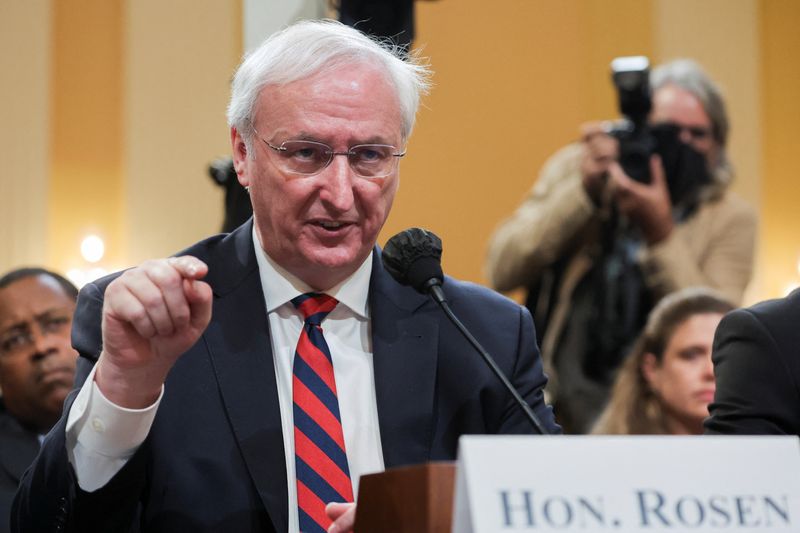3 takeaways from fifth day of Jan. 6 U.S. Capitol riot hearings
2022.06.23 23:58
4/4

Former Acting Attorney General Jeffrey Rosen testifies during fifth public hearing of the U.S. House Select Committee to Investigate the January 6 Attack on the United States Capitol, on Capitol Hill in Washington, U.S., June 23, 2022. REUTERS/Jim Bourg
2/4
By Ross Colvin
WASHINGTON (Reuters) – The fifth day of congressional hearings on the Jan. 6, 2021, attack on the U.S. Capitol by Donald Trump’s supporters heard how the then-president pressured the Justice Department to help him hold onto power after he lost the 2020 election.
The House of Representatives select committee investigating the attack received testimony from three former top department officials – then-acting Attorney General Jeffrey Rosen, his deputy Richard Donoghue, and the then-head of the Office of Legal Counsel, Steven Engel.
Here are takeaways from Thursday’s hearing:
TRUMP TRIED TO FIRE HIS ACTING ATTORNEY GENERAL
Trump was deeply frustrated by what he saw as the Justice Department’s inaction in helping to investigate his false claims of election fraud and tried to fire Rosen and replace him with someone more compliant.
Between Dec. 23, 2020, and Jan. 3, 2021, Trump called or met Rosen almost every day as his efforts to hold onto power became more urgent. He wanted Rosen to pursue various avenues, including appointing a special counsel to investigate suspected election fraud.
“The common element of all of this was the president expressing his dissatisfaction with the Justice Department having not done enough to investigate election fraud,” Rosen said.
Rosen’s deputy, Donoghue, said that in a 90-minute conversation with Trump at the White House on Dec. 27 he bluntly told the president that the fraud allegations had no merit.
“I wanted to try to cut through the noise because it was clear to us that there were a lot of people whispering in his ear, feeding him these conspiracy theories and allegations,” Donoghue said.
When Rosen told Trump at the same White House meeting that the Justice Department could not just snap its fingers and change the outcome of the election, Trump quickly responded, “What I’m just asking you to do is just say it was corrupt and leave the rest to me and the Republican congressmen,” Donoghue recalled.
JEFFREY CLARK’S ROLE
A Trump-supporting Justice Department environmental lawyer, Jeffrey Clark, was a key player in Trump’s efforts to use the department to aid his efforts to overturn his election loss to Democrat Joe Biden. Clark met with Trump in the Oval Office several times without the knowledge of White House counsel Pat Cipollone and Rosen, which was an unusual breach of protocol.
Republican congressman Scott Perry, who helped to spread Trump’s false statements of election fraud, texted the president’s chief of staff Mark Meadows and encouraged him to elevate Clark’s position within the Justice Department, saying time was running out before Jan. 20, Inauguration Day, when Trump was due to leave office.
The hearing began shortly after it was disclosed that federal law enforcement had raided Clark’s Washington-area home.
THE ‘MURDER-SUICIDE’ LETTER
Clark drafted a letter to be sent to state legislatures in some Republican-controlled states, including Georgia, that aimed to sow doubts about Biden’s election win.
The letter alleged that the Justice Department had concerns about election results in multiple states. As it happened, by the time it was written the department had already determined that no widespread fraud had occurred.
“Donald Trump offered Mr. Clark the job of acting attorney general, replacing Mr. Rosen, with the understanding that Mr. Clark would send this letter and take other actions the president requested,” Representative Liz Cheney, the committee’s Republican vice chair, said at the start of the hearing.
Donoghue told the committee he had to read the letter twice to make sure he understood correctly what Clark was proposing “because it was so extreme to me.”
“For the department to insert itself into the political process this way would have had serious effects on the country and possibly trigger a constitutional crisis,” he said.
Donoghue said Clark was undeterred when he told him the Justice Department could not meddle in the election, responding, “I think a lot of people have meddled in this election”
The letter was never sent after Rosen and Donoghue refused to sign it. Cipollone, the White House counsel, said the letter was so toxic that it should never be seen again because if it was ever made public it would be a “murder-suicide.”








